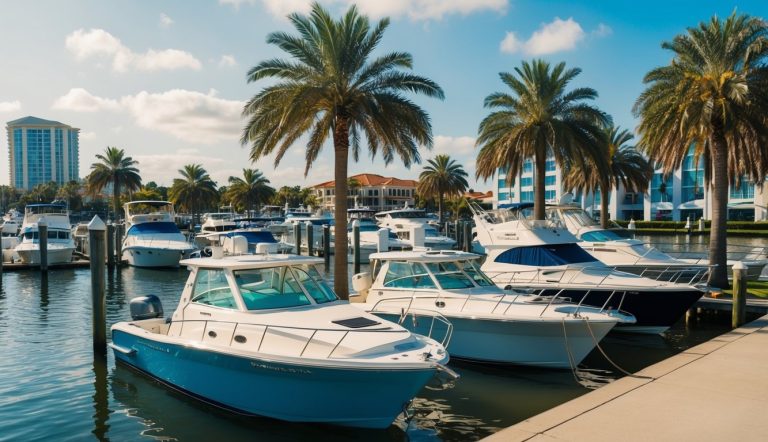Jacksonville’s boat market is diverse and active, reflecting the city’s strong connection to water recreation. As a boat seller in this area, understanding the local market can help you price your vessel correctly and find buyers faster. Let’s explore all about selling boats in Jacksonville!
The Jacksonville market features a wide variety of boats for sale, from luxury yachts to simple fishing vessels. Recent trends show that while used boat sales have decreased by 12.4%, new boat sales have increased by 5.3%. When selling your boat in Jacksonville, it’s important to know which types are most popular. Center console boats are in high demand due to their versatility for offshore fishing. Fishing boats in general sell well in this region.
Pontoon boats attract families looking for leisure cruising on the St. Johns River or Intracoastal Waterway. Power boats and deck boats appeal to water sports enthusiasts. Timing matters in the Jacksonville market. Spring and early summer typically see increased buying activity as boaters prepare for the season.
Your boat’s condition significantly affects its value. First impressions are critical – clean, well-maintained vessels command higher prices and sell faster.
Popular Boat Types in Jacksonville:
- Center Console Fishing Boats
- Pontoon Boats
- Deck Boats
- Offshore Power Boats
- Bay Boats
Thorough research before listing your boat will help you understand competitive pricing. Compare similar models and consider factors like age, engine hours, and additional features.
Preparing Your Boat for Sale
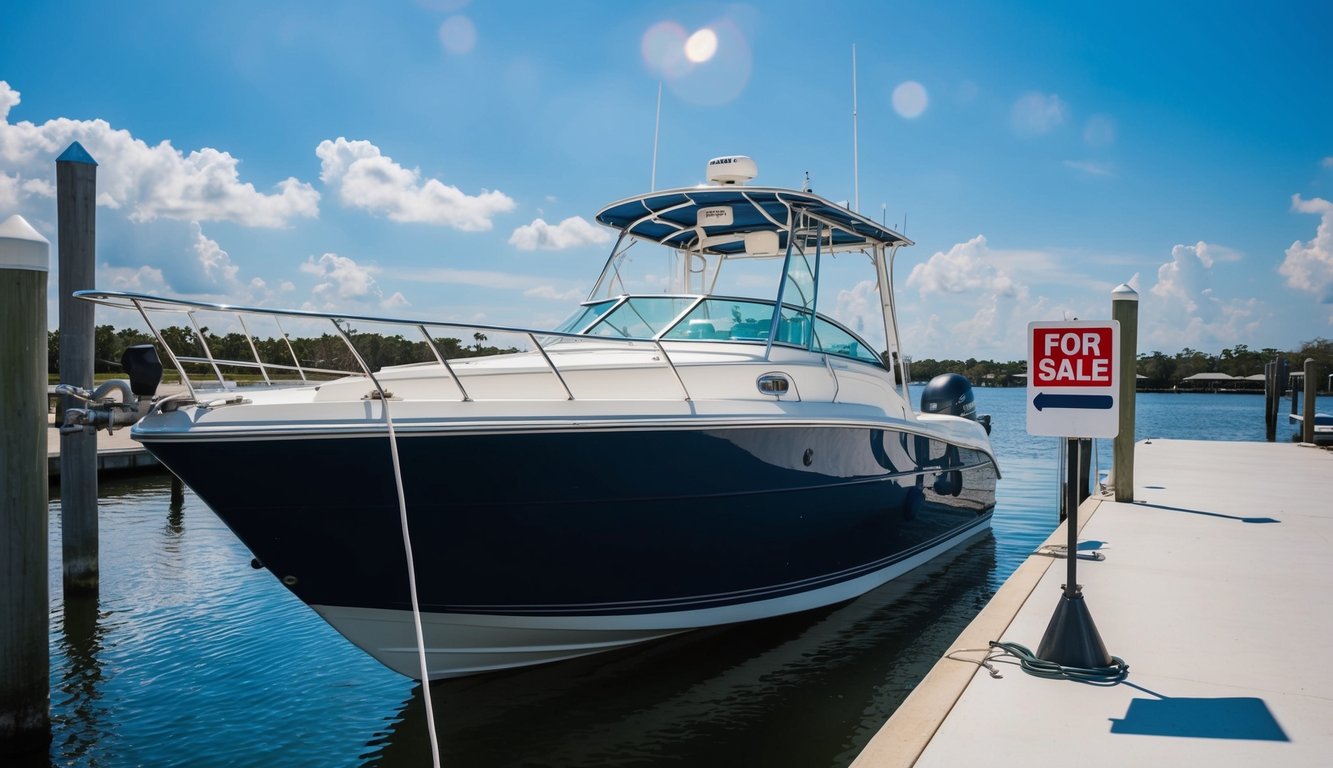
Getting your boat ready for sale in Jacksonville requires attention to detail. Proper preparation will help you attract serious buyers and command the best price for your vessel.
Conducting Thorough Repairs
- Before listing your boat, fix any visible damage or mechanical issues. Buyers are quick to spot problems and will use them to negotiate lower prices.
- Start by inspecting the hull for cracks, scratches, or blistering. Repair these issues professionally to maintain structural integrity. Small cosmetic repairs can yield significant returns on investment.
- Check all electrical systems, including navigation lights, bilge pumps, and electronics. Malfunctioning equipment will deter potential buyers and raise concerns about hidden problems.
- Don’t forget your boat’s upholstery and canvas. Repair tears, replace severely worn sections, and ensure tops and covers are in good condition. First impressions matter, and worn seating can make your entire boat seem neglected.
- Consider hiring a professional to address any engine issues. A smoothly running engine is crucial for a successful sale.
Performing Preventative Maintenance
Keep all maintenance up to date to show potential buyers your boat has been well cared for. This builds confidence in your vessel’s condition.
Essential maintenance tasks include:
- Changing engine oil and filters
- Replacing fuel filters
- Checking and topping off fluids
- Lubricating moving parts
- Testing and servicing the battery
- Inspecting hoses and belts for wear
Consider scheduling a pre-sale engine tune-up to ensure optimal performance during demonstrations. Buyers will be impressed by an engine that starts immediately and runs smoothly. Document all maintenance with receipts and service records. This paperwork proves your diligence and justifies your asking price. Regular maintenance demonstrates your commitment to boat ownership and can be a strong selling point.
Cleaning and Detailing
- A spotless boat suggests careful ownership and attracts more buyers. Clean your boat thoroughly, inside and out, to make it shine.
- Begin with a pressure wash of the hull and deck. Remove stains, algae, and buildup that can make your boat look older than it is. Pay special attention to hard-to-reach areas where dirt accumulates.
- Polish and wax all gel-coat surfaces to restore shine and protect the finish. This simple step dramatically improves appearance and suggests meticulous care.
- Deep clean the interior, including cabins, heads, and storage compartments. Remove personal items and clutter to make spaces appear larger. Eliminate any odors, particularly mildew smells that are common in marine environments.
- Detail the engine compartment by degreasing and cleaning components. A clean engine bay indicates overall good maintenance and care.
Gathering Important Documents
Organized paperwork signals responsible boat ownership and facilitates a smoother sale process.
Essential documents to collect include:
- Title and registration papers
- Maintenance records and receipts
- Owner’s manuals for boat and equipment
- Warranty information (if applicable)
- Recent survey reports
- Documentation of upgrades or improvements
- Insurance claim history
- Safety equipment certificates
- Bill of sale from your purchase
Create a binder with these documents to show prospective buyers. This level of organization builds trust and answers many questions buyers may have about your boat’s history. Consider having a current marine survey completed. While this represents an upfront cost, it provides an objective assessment of condition and value that can help sell your boat quickly.
Setting the Right Selling Price
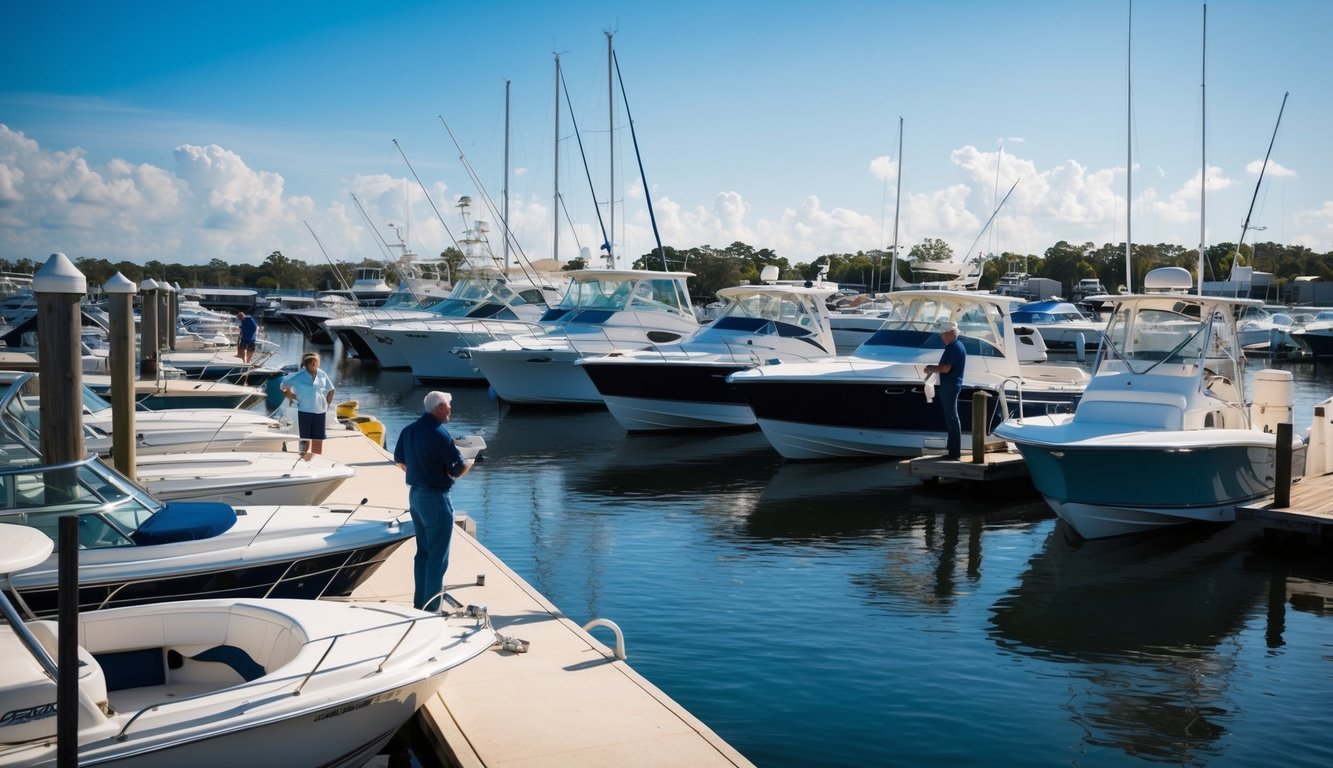
Finding the right price for your boat in Jacksonville’s market is crucial for a successful sale. Pricing too high can leave your vessel sitting on the market for months, while pricing too low means leaving money on the table.
Research is your first step. Use online tools like the Boat Trader Price Checker to see what similar boats are selling for in Florida. Look at boats with comparable features, age, and condition. Your boat’s condition plays a major role in determining its value. Boats that have been regularly cleaned and serviced command higher prices. Make necessary repairs before listing to justify your asking price.
Finding the price sweet spot requires balancing several factors:
- Age and model of your boat
- Overall condition and maintenance history
- Recent upgrades or renovations
- Current market demand in Jacksonville
- Season (spring/summer typically brings better prices)
Remember that first impressions matter. A boat that shows well can often command a price at the higher end of the market range. Consider getting a professional appraisal if you’re unsure. This provides an objective valuation and gives potential buyers confidence in your asking price.
Be prepared to negotiate. Most buyers expect some flexibility, so you might want to build a small buffer into your asking price to accommodate reasonable offers.
Marketing Your Boat Effectively

Effective marketing makes the difference between a boat that sits unsold for months and one that attracts serious buyers quickly. Strong visuals, detailed descriptions, and strategic placement on popular platforms will maximize your boat’s visibility to potential buyers.
Taking Quality Photos
Quality photos significantly impact how quickly your boat sells. Before photographing, deep clean and detail your boat to make it shine in every shot.
Choose a clear, sunny day for optimal lighting. Take photos from multiple angles showing:
- Exterior views (bow, stern, port, starboard)
- Interior cabin spaces
- Engine compartment (clean and well-maintained)
- Electronics and navigation systems
- Storage areas and special features
Avoid poor lighting, cluttered backgrounds, and blurry images. Professional-looking photos attract serious buyers while poor photos chase them away. Make sure to capture any recent upgrades or special features that add value. Remember, clear pictures are a must-have for internet boat sales.
Writing a Compelling Description
Your description should be honest, detailed, and highlight your boat’s best features. Begin with key specifications: make, model, year, length, engine hours, and price.
Include these essential details:
- Recent maintenance and upgrades
- Special features that set your boat apart
- Engine specifications and service history
- Electronics and navigational equipment
- History of use (freshwater vs. saltwater)
Be specific about condition. Rather than saying “good condition,” say “hull recently painted and engines serviced in January 2025.” This builds buyer confidence. Always state your asking price and location clearly. Vague listings without prices frustrate buyers and get passed over quickly.
Listing on the Right Platforms
The Jacksonville boating market offers several effective platforms to showcase your vessel. Local Jacksonville boaters are actively looking for premium offshore fishing boats, center consoles, and bay boats.
Consider these listing options:
Online Marketplaces:
- Boat Trader
- YachtWorld
- Facebook Marketplace
- Craigslist Jacksonville
Local Options:
- Jacksonville marine brokers
- Local boat clubs and marinas
- Regional boat shows
Aggressive marketing through multiple channels increases your chances of finding the right buyer. Consider boat shows which allow potential buyers to see your vessel in person. Respond quickly to inquiries and be prepared to show your boat on short notice. Having maintenance records and documentation ready will help entertain serious offers when they come in.
Enhancing Your Boat’s Appeal

Before selling your boat in Jacksonville, making strategic improvements can significantly increase its value. A well-maintained and updated vessel attracts more potential buyers and commands a higher price in the competitive Florida market.
Upgrading Boat Features
- Start with a deep clean and detail of your boat. Remove stains, polish surfaces, and ensure the hull is free from marine growth. This basic step alone can dramatically improve first impressions.
- Consider upgrading your boat’s electronics. Modern GPS systems, fish finders, and radar equipment make your vessel more attractive to tech-savvy buyers. These upgrades often provide an excellent return on investment.
- Your boat’s power system deserves attention too. Adding extra onboard power like a house battery or generator can make your boat more functional and valuable.
- Don’t forget about your trailer! A well-maintained, rust-free trailer with working lights and new tires makes transporting the boat easier for the new owner.
Adding Value with Accessories
A quality bimini top provides essential sun protection in Florida’s climate while adding visual appeal. If your existing bimini is faded or torn, replacing it before selling is a worthwhile investment.
Consider these high-impact accessories that buyers look for:
- Seating upgrades: New cushions or reupholstered seats make the boat look fresh
- Lighting improvements: LED lighting systems use less power and look modern
- Storage solutions: Custom tackle boxes or compartments appeal to fishing enthusiasts
- Sound systems: Updated marine-grade audio equipment enhances the boating experience
Replacing old equipment and making strategic upgrades significantly improves perceived value. Focus on accessories that enhance comfort, functionality, and appearance.
Navigating Boat Sale Transactions
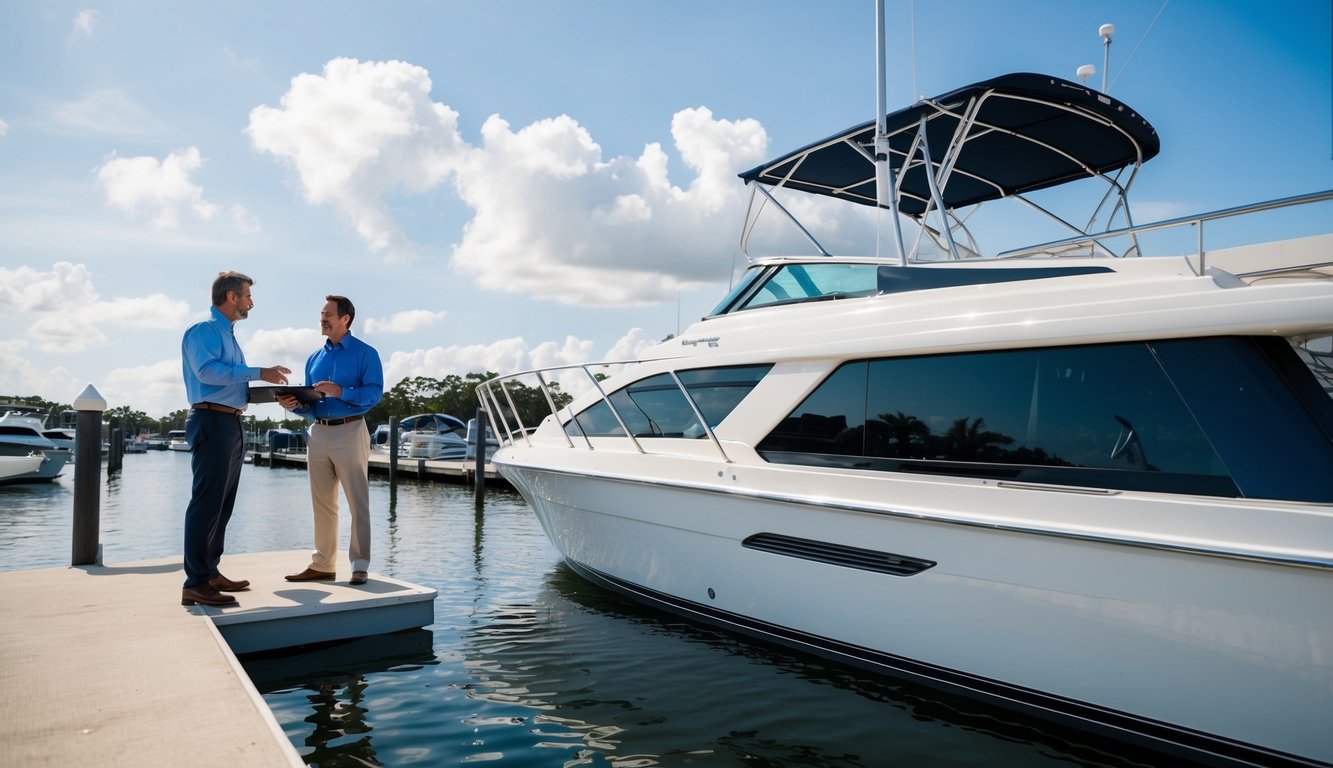
The boat sale process in Jacksonville involves several key steps to ensure a smooth transfer of ownership. Proper documentation, negotiation skills, and attention to legal requirements will protect both you and the buyer.
Creating a Sales Agreement
A clear sales agreement is essential when selling your boat. This document should include the boat’s description, purchase price, deposit amount, and conditions of sale.
Be sure to detail:
- Complete boat specifications (make, model, year, HIN)
- Inventory of included equipment
- Payment terms and method
- Delivery details and timeline
- Warranty information or “as-is” condition statement
You can find boat sales agreement templates online, but consider having an attorney review it. This small investment can prevent costly disputes later. The agreement should also address survey requirements and sea trial conditions if applicable. These contingencies are common in boat sales and protect both parties.
Handling Offers and Negotiations
When you receive an offer, evaluate it carefully against your asking price and market research. Don’t rush to accept the first offer that comes your way.
Be prepared to negotiate by:
- Knowing your absolute minimum acceptable price
- Understanding your boat’s condition relative to the market
- Having documentation of recent maintenance or upgrades
Professional brokers can be valuable during negotiations, as they understand market trends and buyer psychology. They help maintain emotional distance during the process. Respond to all offers promptly and professionally. If you must counter, provide clear reasoning based on your boat’s value points. This approach builds trust with potential buyers.
Finalizing the Sale
Once you’ve accepted an offer, move quickly to complete the transaction. In Florida, you’ll need to provide the buyer with:
- Signed bill of sale
- Properly transferred title
- Satisfaction of any liens
- Service records and owner’s manuals
For boats with documented Coast Guard registration, different paperwork is required than for state-registered vessels. Verify current requirements before closing. Consider meeting at your bank or the buyer’s bank to exchange funds and documents. For higher-value boats, escrow services provide additional security.
After the sale, cancel your insurance and notify the Florida Fish and Wildlife Conservation Commission of the ownership change. This step protects you from liability for the boat after it’s no longer yours.
Understanding Regulatory and Tax Considerations
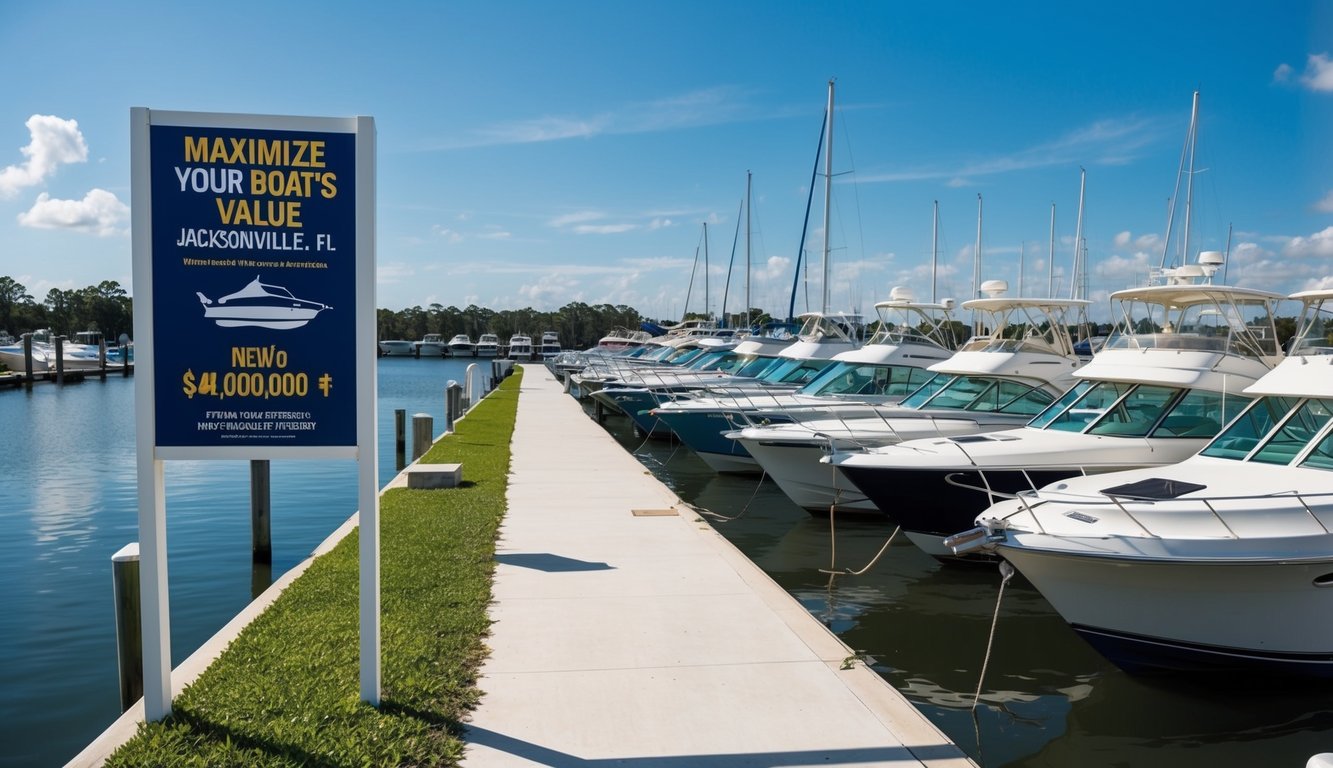
Selling your boat in Jacksonville involves navigating specific legal requirements and tax implications. Proper documentation and understanding of tax laws can help you avoid penalties while maximizing your profit.
Compliance with Florida Boating Laws
When selling your boat in Jacksonville, you must provide proper documentation to the buyer. This includes a valid title free of liens and a bill of sale clearly itemizing the vessel’s value separate from extras.
Florida law requires you to have:
- Current boat registration
- Documentation of any modifications
- Maintenance records
- Proof of ownership
Make sure to cancel your registration after the sale. This protects you from liability for future incidents involving the vessel. You should also remove your vessel from the water before the sale is complete unless specifically arranged with the buyer. Florida boating laws require proper transfer of registration to the new owner.
Calculating Property Tax Implications
- Florida has specific tax laws regarding boat sales that can impact your financial outcome. The state charges a 6% sales tax on boat purchases, but there’s an important cap to know about.
- The maximum tax on any boat sale is $18,000, regardless of the vessel’s price. This cap applies to both sales tax and use tax combined. For expensive boats, this presents a significant advantage.
- When selling your boat, you should clearly itemize the sale price. Separate the vessel’s value from extras like electronics and fishing gear. This helps your buyer potentially reduce their tax burden.
- Property tax considerations also matter if you’ve been paying annual tangible personal property tax on your vessel. After selling, be sure to notify the county tax collector to remove the boat from your tax assessment.
